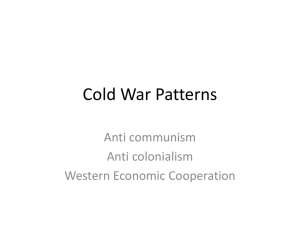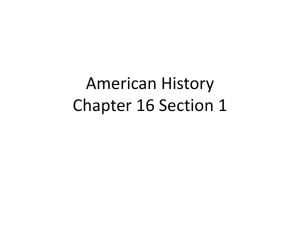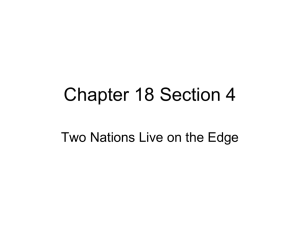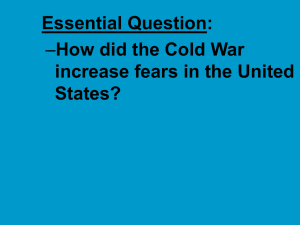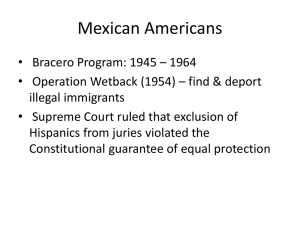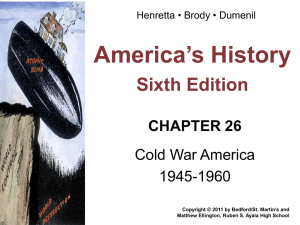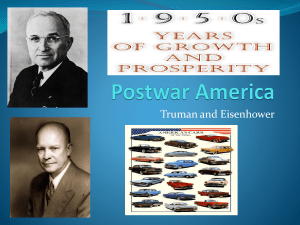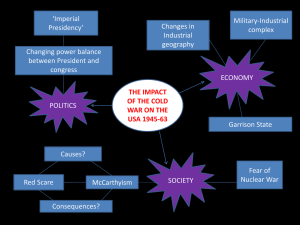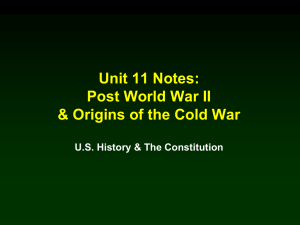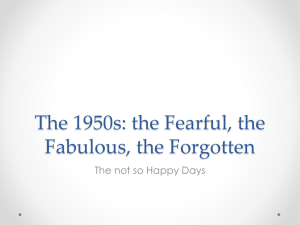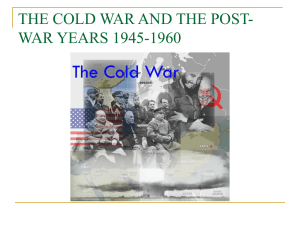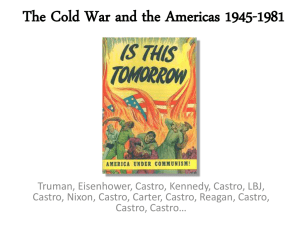AMH Chapter 15 Section 4
advertisement
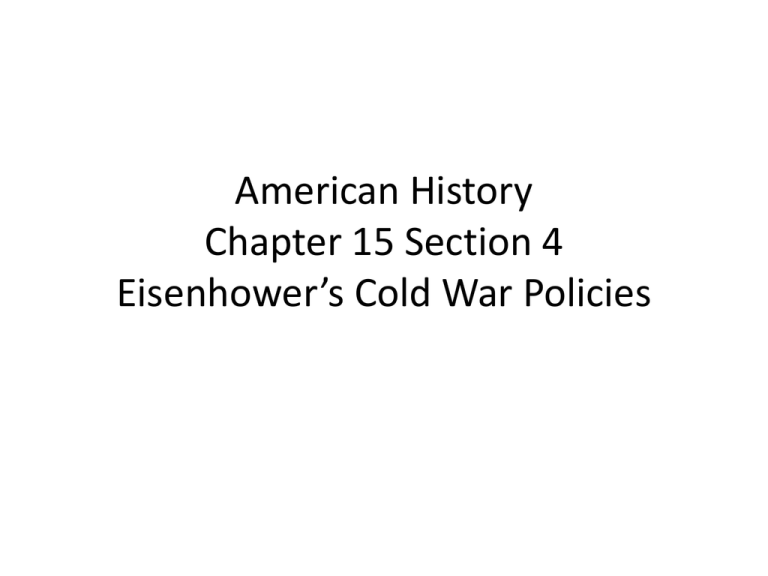
American History Chapter 15 Section 4 Eisenhower’s Cold War Policies Truman’s Failed Foreign Policy • Many Americans believe President Truman's foreign policy was not working by the end of 1952 because The Soviet Union had acquired the atomic bomb and consolidated its hold on Eastern Europe. We Like “Ike” • Republican Dwight D. Eisenhower, war hero from World War II won the 1952 presidential election in a landslide. • Eisenhower believed the two keys to victory in the Cold War were a strong military and a strong, free enterprise economy. Massive Retaliation • Eisenhower also thought that conventional wars cost too much money. • He believed the United States had to prevent wars by threatening nuclear war. • This policy became known as massive retaliation. Basically, more atomic bombs, less soldiers! • Eisenhower cut military spending to $34 billion by increasing the number of nuclear bombs from 1,000 in 1953 to 18,000 in 1961 and reducing the size of the army. Brinkmanship • Eisenhower supported brinkmanship—the willingness to go to brink of war to force another nation to back down. • Some thought this policy was dangerous, but Eisenhower used the threat to end the Korean War and protect Taiwan. • To end the Korean War, Eisenhower told the Chinese that the United States would continue the war under “circumstances of our own choosing”—a hint at nuclear attack. Crisis in Egypt • In 1955, Egypt seized the Suez Canal from an Anglo-French company that controlled it. – Egypt wanted to use the profits from the canal to pay for a dam they were planning to build. • In response, Britain and France invaded Egypt. • The Soviet Union offered to help Egypt by attacking Britain and France. • Eisenhower threatened a nuclear war with the Soviets. • Britain and France retreated. Covert Operations • Eisenhower knew that brinkmanship would not work all the time. • He knew it would not stop Communists from starting revolutions within countries. • Eisenhower used covert—or hidden— operations to prevent revolutions. CIA • These were run by the Central Intelligence Agency, or CIA. • Many of these operations took place in developing nations, or nations with mostly agricultural economies. • Many of these nations blamed American capitalism for their problems. • They looked to the Soviet Union as a model for industrialization. Eisenhower had two strategies… • Americans feared that these nations would stage Communist revolutions, so the United States and Eisenhower had two strategies to prevent other nations from aligning with the Soviet Union: 1. The United States offered financial aid (money) to many of these nations. 2. In places where the Communists were stronger, the CIA used covert operations. The CIA overthrew anti- American leaders and replaced them with pro-American leaders. Covert Operations: Iran • Covert operations worked in Iran. • There the prime minister overthrew the Shah of Iran and then wanted to make an oil deal with the Soviet Union. • The CIA organized riots and a coup, and the prime minister was overthrown. • The Shah returned to power. Covert Operation: Guatemala • In Guatemala, the president won his office with Soviet support. • In 1951, Jacobo Arbenz Guzmán's land reforms took over large estates, which some of the estates were owned by Americans. • Then Guatemala received weapons from Czechoslovakia (a Communist nation). • The CIA responded to Guzmán's land reform program by arming (giving weapons) Guatemalan opposition and trained them in secret camps in Nicaragua and Honduras. Sometimes covert operations did not work • By 1956, Nikita Krushchev had emerged as the leader of the Soviet Union, taking over after Stalin death. • The CIA got a copy of a speech Krushchev made in which he attacked Stalin’s policies. • The CIA broadcast the speech in Eastern Europe. • In 1956 a revolt in Hungary began. – The Soviets moved troops into Hungary and stopped the revolt. Eisenhower Doctrine • In 1957 Eisenhower asked Congress to allow the use of the military to stop communism in the Middle East. • This became known as the Eisenhower Doctrine. • American troops went to Lebanon to protect its government. • In 1958 Khrushchev demanded that the United States and its allies take their troops out of West Berlin. • The United States threatened to use military force to protect Berlin. – The Soviet Union backed down again. U-2 Incident • Khrushchev visited Eisenhower in the United States in late 1959. • They planned to hold a summit (formal meeting of two super powers) in Paris in 1960. • Before the summit began, an American U-2 spy plane was shot down over the Soviet Union. • As a result of the destruction of the American U-2 spy plane, Krushchev broke up the summit after Eisenhower refused to apologize for the incident. Military Industrial Complex • As Eisenhower prepared to leave office, he delivered a farewell address. In his speech, • He warned Americans to be on guard against the new relationship that was developing between the military and the defense industry and its influence in a democracy.
